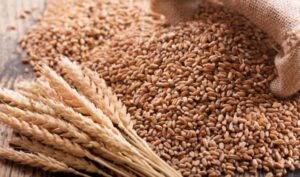
The IMK agricultural holding has completed its wheat harvest and threshed 153,000 tons of grain from 20,700 hectares, the holding’s press service reported on Facebook.
The company noted that in the 2025 season, the average wheat yield was 7.4 tons/ha, which is a record for all 18 years of the company’s operations and exceeded the average wheat yield in Ukraine by 71%. IMK referred to data from the Ministry of Economy, according to which as of August 14, 2025, the average wheat yield in Ukraine was 4.32 tons/ha.
“This season has shown that true professionalism is measured not only by equipment and technology, but also by the ability of the team to work cohesively in the most difficult conditions. We managed not only to maintain stability, but also to once again break the yield record with 7.4 tons per hectare,” said Bogdan Kryvitsky, IMK’s chief operating officer.
He thanked the employees of the Sumy cluster, who achieved a yield of 8.5 tons per hectare.
IMK is an integrated group of companies operating in the Sumy, Poltava, and Chernihiv regions (northern and central Ukraine) in the crop production, elevators, and warehousing segments. The land bank is 116,000 hectares, storage capacity is 554,000 tons, and the 2024 harvest is expected to be 864,000 tons.
IMK ended 2024 with a net profit of $54.54 million, compared to a net loss of $21.03 million in 2023. Revenue increased by 52% to $211.29 million, gross profit quadrupled to $109.10 million, and normalized EBITDA increased 25-fold to $86.11 million.
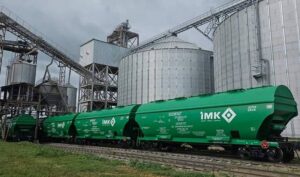
According to the results of 2024 and the first quarter of 2025, IMC (Industrial Milk Company) is in good financial condition, intends to reduce its debt below $20 million by the end of the year and will return to paying dividends, IMC CEO Alexander Verzhikhovsky said in an interview with the Polish edition of parkiet.com.
He noted that as of the end of March 2025, IMC had $44.7 million in cash and cash equivalents, which is 73% more than a year earlier. This allows the agricultural holding to reduce its financial debt as planned.
According to the CEO of the agricultural holding, IMC’s debt as of the end of 2024 amounted to more than $23 million, compared to $46 million at the end of 2023.
“This year, we are striving to further reduce our debt and plan to bring it down to below $20 million. At the same time, we have returned to paying dividends and are working to share our profits with shareholders in the form of significant dividends next year,” the IMC CEO emphasized.
In addition, he said that in March 2025, IMC completed investments in its own rolling stock. In total, since 2024, the company has invested about $22 million in the purchase of a fleet of 300 grain carriers.
Verzhykhovsky explained that owning grain cars allows the agricultural holding to largely abandon the use of leased cars for grain transportation to ports. “Currently, IMC can transport up to 80% of our annual grain production with its own railcars.
In addition, in 2024, the agricultural holding invested heavily in the renewal and modernization of its fleet, which directly affects the production processes related to soil preparation, sowing campaign, their efficiency and optimization of operations.
“IMC intends to maintain annual investments in equipment, technology and infrastructure modernization at the level of $10-12 million. The company does not plan to issue shares or increase debt. Investments will be made at the expense of own funds,” summarized IMC CEO.
IMC Agroholding is an integrated group of companies operating in Sumy, Poltava and Chernihiv regions (north and center of Ukraine) in the crop production, elevators and warehouses segments. The land bank is 116 thousand hectares, storage capacity is 554 thousand tons, with a harvest of 864 thousand tons in 2024.
IMC ended 2024 with a net profit of $54.54 million compared to a net loss of $21.03 million in 2023. Revenue increased by 52% to $211.29 million, gross profit quadrupled to $109.10 million, and normalized EBITDA increased 25 times to $86.11 million.
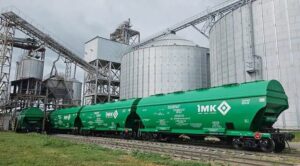
In 2024, the elevators of the IMC agricultural holding shipped a record volume of grain – more than 1.1 million tons, in January-June 2025, they completed the shipment of the remaining crop of 2024 and carried out preparatory work for the reception of the new harvest, the press service of the agricultural holding reported on Facebook.
The agricultural holding noted that in recent years, several projects have been implemented at IMC elevators as part of the Smart Green Strategy, in particular in the use of green energy.
“Four of IMC’s elevators have already been equipped with solar panels, and installation is underway at two more facilities, which will cover the demand for electricity from green sources for office buildings and critical infrastructure of elevators. This also contributes to the energy independence of the elevators and the continuous production process despite possible interruptions in electricity supply due to Russian shelling of Ukraine’s energy system,” IMC said.
In addition, two of IMC’s elevators and three grain drying complexes have installed heat generators that run on sunflower pellets and grain waste, which allows replacing natural gas with biofuel for the grain drying process.
“This year’s scheduled repairs at IMC’s elevators are already at the completion stage. We are currently disinfecting the production facilities. IMC elevators are ready to accept the new winter wheat harvest,” emphasized Andriy Havrylenko, Deputy CEO of IMC for Grain Storage and Processing.
IMC Agro Holding is an integrated group of companies operating in Sumy, Poltava and Chernihiv regions (north and center of Ukraine) in the crop production, elevators and warehouses segments. The land bank is 116 thousand hectares, storage capacity is 554 thousand tons, with a harvest of 864 thousand tons in 2024.
IMC ended 2024 with a net profit of $54.54 million against a net loss of $21.03 million in 2023. Revenue increased by 52% to $211.29 million, gross profit quadrupled to $109.10 million, and normalized EBITDA increased 25 times to $86.11 million.
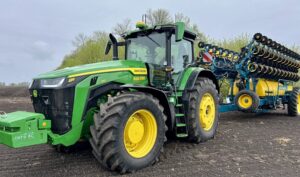
IMC Agro Holding started the 2025 spring sowing campaign on April 16 and plans to plant 64.8 thou hectares of corn and 24.9 thou hectares of sunflower, the company’s press service reports.
“Despite the rainy and cold start to spring, as well as frequent air raids, thanks to timely tillage operations in the fall of 2024, the company managed to start the current year’s sowing campaign on time,” said Bohdan Kryvitsky, Chief Operating Officer of IMC.
He expressed confidence that due to the quality upgrade of equipment, IMC will be able to meet the optimal deadlines.
“All inventories have been purchased and delivered, the machinery is in good working order, and all production personnel are ready to lay the foundation for the upcoming spring crops,” Mr. Krivitsky emphasized.
As reported, in the fall of 2024, IMC sowed winter wheat on an area of 20.7 thou hectares, which is about 17% of the company’s land bank.
IMC Agro Holding is an integrated group of companies operating in Sumy, Poltava and Chernihiv regions (north and center of Ukraine) in the crop production, elevators and warehouses segments. The company has a land bank of about 120 thousand hectares and storage capacities of 554 thousand tons, with a harvest of 1.002 million tons in 2023.
In January-September 2024, IMC increased its revenue to $140.8 million, up 43% compared to the same period in 2023. The increase in normalized EBITDA in January-September 2024, as well as the increase in net profit in the agricultural holding, was attributed to higher sales volumes and higher grain prices.
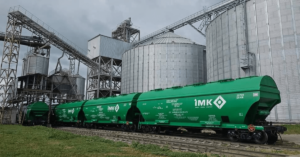
IMC Agro Holding has added 150 grain carriers to its own railcar fleet, which now totals 300 cars, its press service reports.
According to the report, in 2024-2025, IMC invested about $22 million in grain cars.
“This railcar fleet will allow us to largely abandon leased railcars for the transportation of grain to ports,” IMC CEO Oleksandr Verzhykhovsky was quoted as saying in the report.
He added that, according to the agricultural holding, after the commissioning of this fleet, IMC will be able to transport up to 80% of the annual volume of grain grown with its own wagons, providing confidence in the timely execution of the railway component of export logistics and significantly saving on rail transportation.
IMC Agro Holding is an integrated group of companies operating in Sumy, Poltava and Chernihiv regions (north and center of Ukraine) in the crop production, elevators and warehouses segments. The Group’s land bank is about 120 thousand hectares and storage capacity is 554 thousand tons, with a harvest of 1.002 million tons in 2023.
In 2023, IMC posted a net loss of $21.03 million compared to $1.12 million a year earlier, and its EBITDA decreased 11.3 times to $3.22 million. Revenue increased by 22.3% to $139.45 million, while the share of exports decreased to 68% from 73% a year earlier.

In January-September 2024, IMC Agro Holding increased its revenue to $140.8 million, up 43% year-on-year, according to the company’s report.
According to the report, the most significant part of the company’s revenue comes from corn sales, accounting for 47.4% in the first nine months of 2024 and 83.6% in the first nine months of 2023.
In addition, in January-September 2024, the agroholding increased its revenue from sunflower sales almost fivefold to $23.4 mln. Revenue from wheat sales increased to $49.7 mln, or five times.
The increase in normalized EBITDA in January-September 2024, as well as the increase in net profit, is due to the increase in sales volumes and higher grain prices at the end of the reporting date, IMC explained.
As reported, in the season-2024, IMC grew spring crops on 90 thou hectares, of which 65.8 thou hectares were allocated for corn and 24.2 thou hectares for sunflower. The agricultural holding completed sunflower harvesting in the last days of September. The company produced 77.7 thousand tons of gross harvest with a yield 60% higher than the national average of 3.2 tons/ha.
IMC Agro Holding is an integrated group of companies operating in Sumy, Poltava and Chernihiv regions (north and center of Ukraine) in the crop production, elevators and warehouses segments. The Group’s land bank is about 120 thousand hectares and storage capacity is 554 thousand tons, with a 2023 harvest of 1.002 million tons.
In 2023, IMC posted a net loss of $21.03 million compared to $1.12 million a year earlier, and its EBITDA decreased 11.3 times to $3.22 million. Revenue increased by 22.3% to $139.45 million, while the share of exports decreased to 68% from 73% a year earlier.